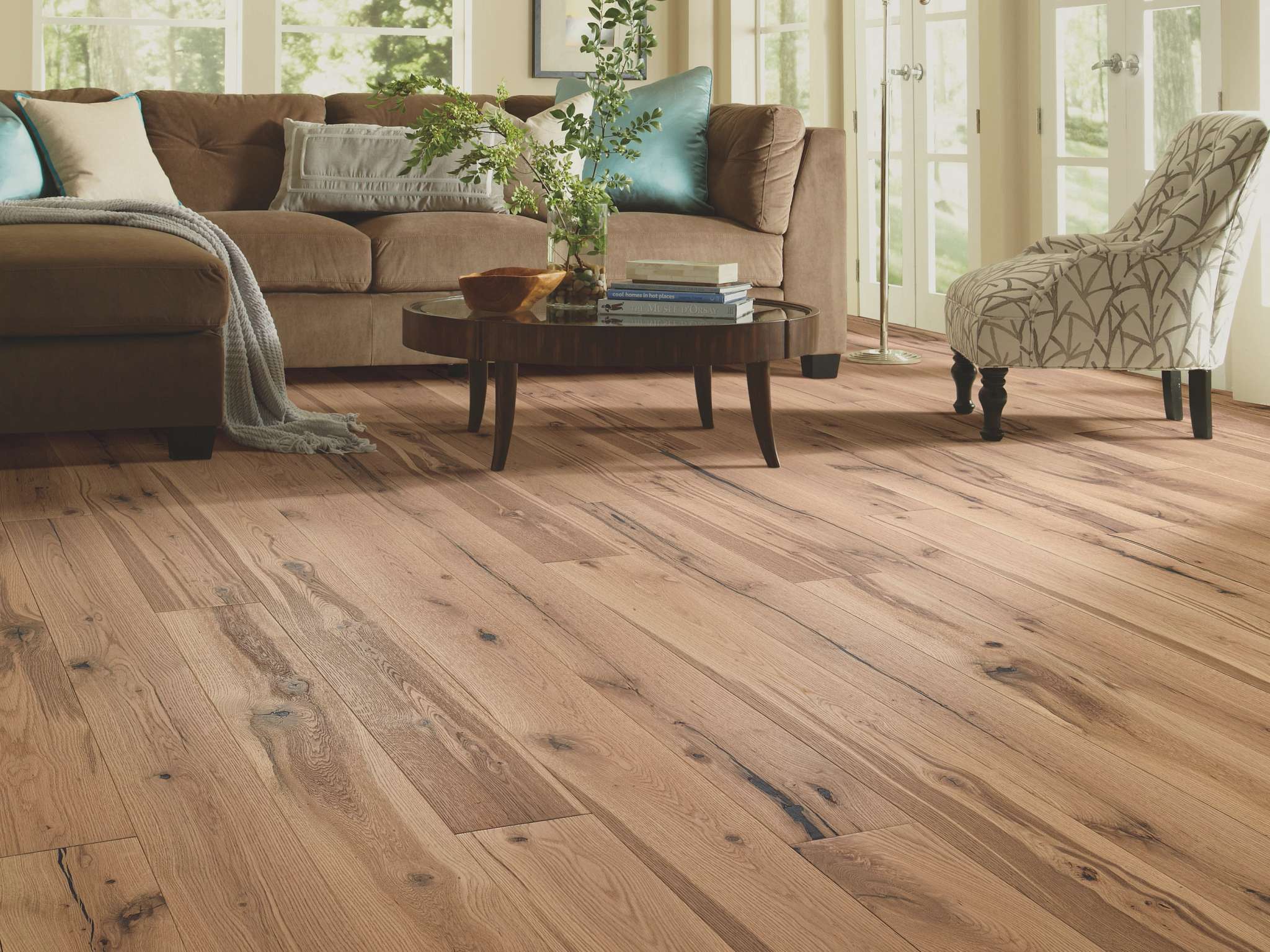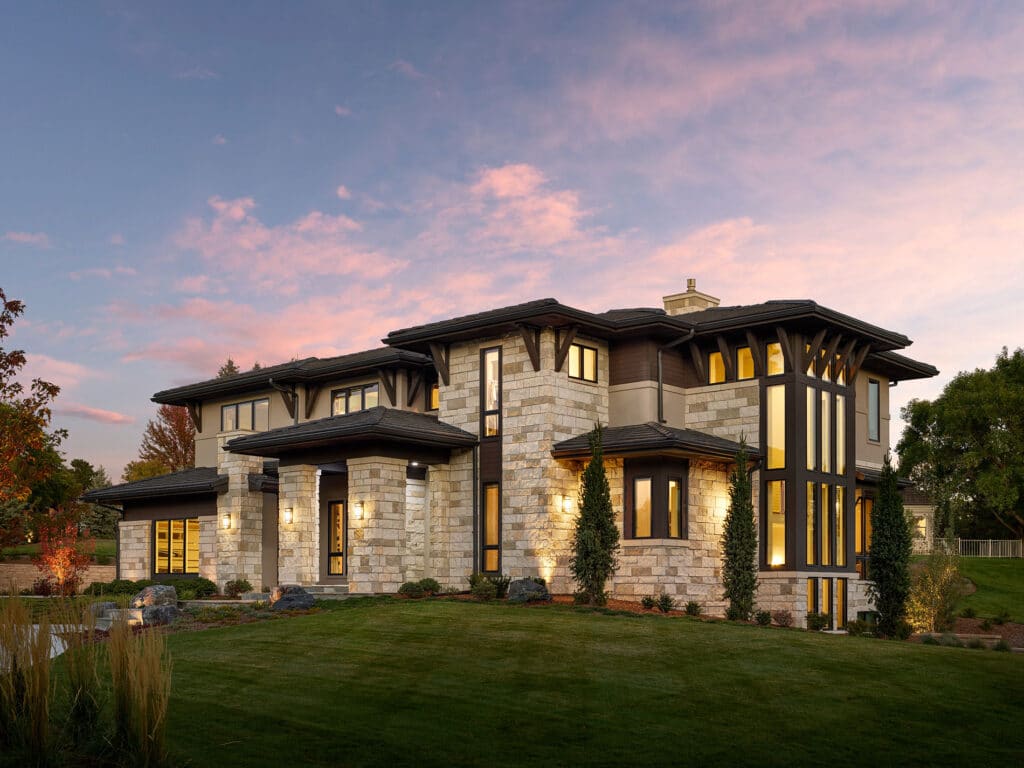- Posts :
Flooring is one of the most important elements in any home, as it has a significant impact on the overall look and feel of the space. When it comes to high-end custom homes, selecting the right flooring is especially important, as it not only sets the tone for the design aesthetic but also needs to be durable and functional for everyday use. Three of the most popular flooring options for custom homes are hardwood, LVT, and engineered flooring. Each type of flooring has its own unique features and benefits, but also comes with some drawbacks to consider. In this article, we’ll compare hardwood flooring to LVT flooring and engineered flooring to help you decide which option is right for your luxury custom home.
What Is Hardwood Flooring?
Hardwood flooring is a type of flooring made from natural hardwood materials, usually cut from a single piece of wood. It is considered a classic and timeless flooring option that has been used for centuries due to its durability and natural beauty.
There are many different types of hardwoods used for flooring, with each offering its own unique look and characteristics. Some of the most popular hardwoods used for flooring include:
Oak: One of the most common and affordable hardwood flooring options, oak has a natural, warm tone and is durable enough to withstand heavy foot traffic.
Maple: Maple hardwood flooring is known for its pale, creamy color and fine, uniform grain. It is also quite durable, making it ideal for high-traffic areas.
Walnut: Walnut is a darker hardwood that has a rich, luxurious look. It is more expensive than oak or maple, but its beauty and durability make it a popular choice for well-appointed custom homes.
Cherry: Cherry hardwood flooring has a warm, reddish-brown color and a distinctive grain pattern. It is softer than some other hardwoods, but its beauty and natural luster make it a popular choice for elegant and traditional homes.
Mahogany: Mahogany is a rich, reddish-brown hardwood that has a luxurious look and feel. It is a more expensive option, but its durability and richness are seen in both luxury homes and high-end commercial spaces.
Overall, there are many different types of hardwoods used for flooring, each with its own unique characteristics and benefits. Homeowners should consider factors such as budget, design aesthetic, and durability when selecting the right hardwood for their custom home.
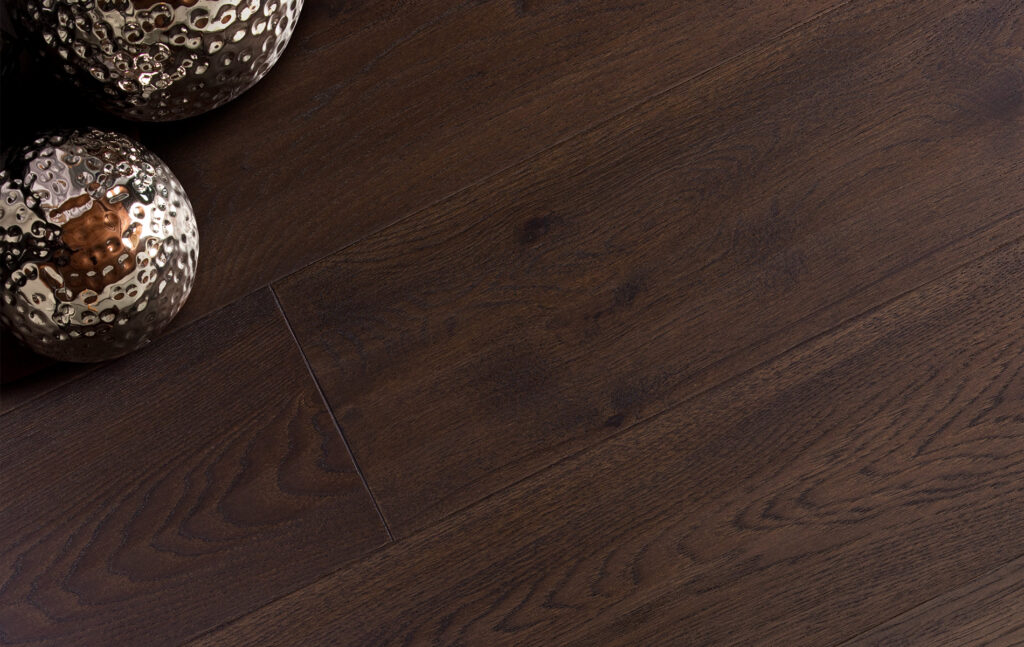
Pros To Hardwood Flooring:
1 Aesthetic appeal: Hardwood floors provide a classic and elegant look to any home. They are a timeless flooring option and can increase the overall value of a home.
2 Durability: Hardwood floors are known for their durability and can withstand heavy foot traffic and everyday wear and tear.
3 Low maintenance: Hardwood floors are easy to clean and maintain. They can be swept or vacuumed regularly, and spills can be wiped up quickly with a damp cloth.
4 Versatility: Hardwood floors come in a wide range of colors, finishes, and styles, so they can fit any design aesthetic.
5 Environmental friendliness: Hardwood floors can be sustainably sourced.
Cons To Hardwood Floors:
1 Cost: Hardwood floors can be more expensive than other flooring options, especially if the wood is rare or exotic.
2 Prone to scratches and dents: While hardwood floors are durable, they can still be prone to scratches and dents, especially if heavy furniture is moved across them.
3 Moisture damage: Hardwood floors can be damaged by moisture, so they are not recommended for use in areas like bathrooms or basements where there may be high humidity or potential for water damage.
4 Noise: Hardwood floors can be noisy, especially in multi-story homes. This can be mitigated by adding rugs or sound-absorbing underlayment.
5 Installation: Hardwood floors require professional installation, which can add to the overall cost and time needed for the project.
What is LTV Flooring?
LVT flooring, or luxury vinyl tile flooring, is a type of flooring made from vinyl that has a high-end look and feel. It is designed to mimic the look of natural materials such as hardwood, stone, or ceramic tile, but is much more affordable and durable than those materials.
LVT flooring is made up of several layers, including a wear layer, a printed design layer, and a backing layer. The wear layer is a clear protective layer that helps to protect the flooring from scratches, stains, and general wear and tear. The printed design layer is where the unique look of the flooring comes from, as it can be printed to mimic a wide range of natural materials. The backing layer provides additional stability and cushioning.
One of the biggest advantages of LVT flooring is its durability. It is highly resistant to scratches, stains, and water damage, making it ideal for high-traffic areas, such as kitchens and bathrooms. It is also easy to clean and maintain, as it can be swept, vacuumed, and mopped like traditional flooring.
LVT flooring is available in a wide range of colors and patterns, making it easy to find a style that fits with any design aesthetic. It is also more affordable than natural materials, such as hardwood or stone, making it an attractive option for homeowners on a budget.
Overall, LVT flooring is a versatile and affordable flooring option that provides the look of natural materials with added durability and low maintenance requirements.
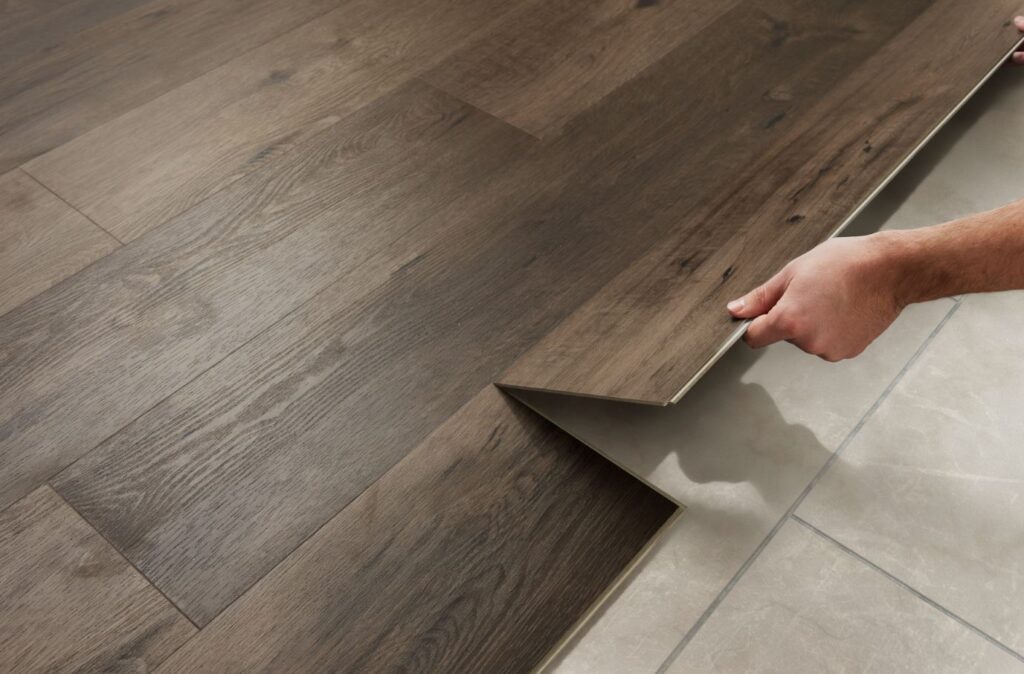
Pros For Using LTV Flooring
1 Durability: Luxury Vinyl Tile (LVT) floors are known for their durability and can withstand heavy foot traffic and everyday wear and tear.
2 Cost: LVT floors can be less expensive than hardwood floors, making them a cost-effective option for a high-end custom home.
3 Water-resistant: LVT floors are water-resistant, making them suitable for use in areas like bathrooms, laundry rooms, and kitchens.
4 Low maintenance: LVT floors are easy to clean and maintain. They can be swept or vacuumed regularly, and spills can be wiped up quickly with a damp cloth.
5 Versatility: LVT floors come in a wide range of colors, finishes, and styles, so they can fit any design aesthetic.
Cons For Using LTV Flooring:
1 Less Aesthetic appeal: While LVT floors can mimic the look of hardwood or stone, they may not have the same aesthetic appeal and timeless elegance as hardwood floors.
2 Can be prone to scratches: Although quite durable, LVT floors can still be prone to scratches and may require protective pads under furniture legs to prevent damage.
3 Environmental impact: LVT floors are made from synthetic materials and may not be as eco-friendly as hardwood floors.
4 May require professional installation: While LVT floors can be installed as a DIY project, more complex installations may require professional installation, which can add to the overall cost.
5 Can be noisy: LVT floors can be noisy underfoot, especially in multi-story homes. This can be mitigated by adding sound-absorbing underlayment.
What Is Engineered Flooring?
Engineered flooring is a type of flooring that is made from several layers of wood or wood composite materials. It is designed to mimic the look of natural hardwood flooring, but is generally more affordable and has better moisture resistance properties than solid hardwood flooring.
Engineered flooring typically consists of a top layer of hardwood veneer, which is glued to a core layer of plywood or high-density fiberboard. The top layer is typically made from high-quality hardwood species such as oak, maple, or walnut, and can be sanded and refinished several times if necessary.
One of the main advantages of engineered flooring is its stability. Because it is made from multiple layers of wood, it is less prone to warping or cupping than solid hardwood flooring. It is also more resistant to moisture, making it a good choice for high-humidity environments, such as basements or bathrooms.
Engineered flooring is available in a wide range of colors and styles, making it easy to find a look that fits with any design aesthetic. It is also relatively easy to install, with many options available in a click-and-lock format that can be installed as a floating floor.
Overall, engineered flooring is a durable and versatile flooring option that provides the look of natural hardwood flooring with added stability and moisture resistance. It is a popular choice for high-end custom homes and renovations, as it offers a balance between affordability and luxury.
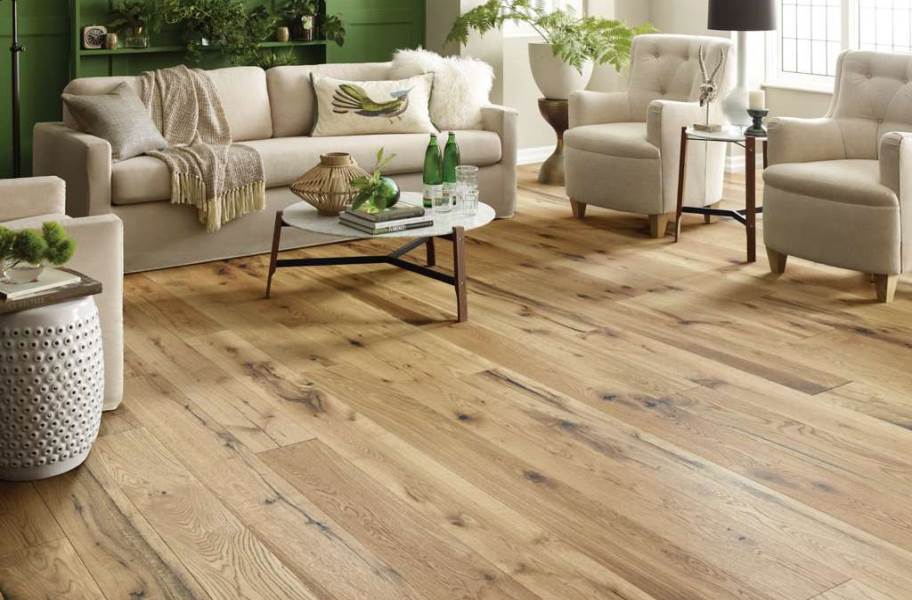
Pros For Using Engineered Flooring
1 Durability: Engineered flooring is generally more durable than traditional hardwood floors and is designed to withstand heavy foot traffic and everyday wear and tear.
2 Cost-effective: Engineered flooring can be less expensive than solid hardwood floors, making it a cost-effective option for a high-end custom home.
3 Easy installation: Engineered flooring can be installed quickly and easily as a floating floor or by gluing it down, reducing installation time and cost.
4 Environmental friendliness: Engineered flooring is often made from sustainable materials, making it an eco-friendly flooring option.
5 Moisture-resistant: Engineered flooring is more moisture-resistant than traditional hardwood floors and can be installed in areas with higher humidity levels, such as bathrooms and basements.
Cons For Using Engineered Flooring:
1 Less Aesthetic appeal: While engineered flooring can mimic the look of hardwood, it may not have the same aesthetic appeal and timeless elegance as solid hardwood floors.
2 Can be prone to scratches: Although durable, engineered flooring can still be prone to scratches and may require protective pads under furniture legs to prevent damage.
3 Limited refinishing options: Unlike solid hardwood floors, engineered flooring can only be refinished a limited number of times due to the thickness of the top layer.
4 May not increase home value as much as solid hardwood: While engineered flooring can increase the value of a home, it may not have the same impact on resale value as traditional hardwood floors.
5 Quality can vary: The quality of engineered flooring can vary depending on the manufacturer, so it’s important to choose a reputable brand for the best results.
What Choice is Right For You?
Choosing the right flooring option for a luxury home will depend on a variety of factors, including budget, design aesthetic, durability, and maintenance requirements. Here are some things to consider when deciding between LVT, wood floors, or engineered floors:
LVT floors may be a good option if:
• The budget is a primary concern and cost-effectiveness is a priority.
• The home is located in an area with high humidity or moisture, such as a beachfront property or a home near a lake.
• Low maintenance and water-resistance are important factors, especially if the home has children or pets.
• The design aesthetic calls for a modern, sleek look with a wide variety of color and texture options.
Wood floors may be a good option if:
• A timeless, classic look is desired, and the budget allows for it.
• The home’s location and climate are not prone to moisture damage, such as a dry, inland location.
• Durability and longevity are a priority.
• The design aesthetic is more traditional and emphasizes natural materials and textures.
Engineered floors may be a good option if:
• The budget is a primary concern, but a high-end look is still desired.
• Moisture resistance is important, but hardwood floors are preferred.
• Low maintenance and ease of installation are important factors.
• A variety of color and texture options are desired, but the look of hardwood is preferred.
Ultimately, the decision will come down to personal preference and what factors are most important to the homeowner. All three options can be a great fit for a high-end luxury home, depending on the specific needs and design aesthetic of the space.
Found the perfect lot? Already own land? Call us today to schedule your free feasibility estimate! Know your total project cost before you commit to any decisions. We pride ourselves on a customer-oriented experience, always putting your needs first. You can reach the Thomas Sattler Homes Sales Team at <a href=”tel:7204493562″>Call (720)449-3562</a> or online at ThomasSattlerHomes.com.
The author generated this text in part with GPT-3, OpenAI’s large-scale language generation model. Upon generating draft language, the author reviewed, edited, and revised the language to their own liking and takes ultimate responsibility for the content of this publication.

